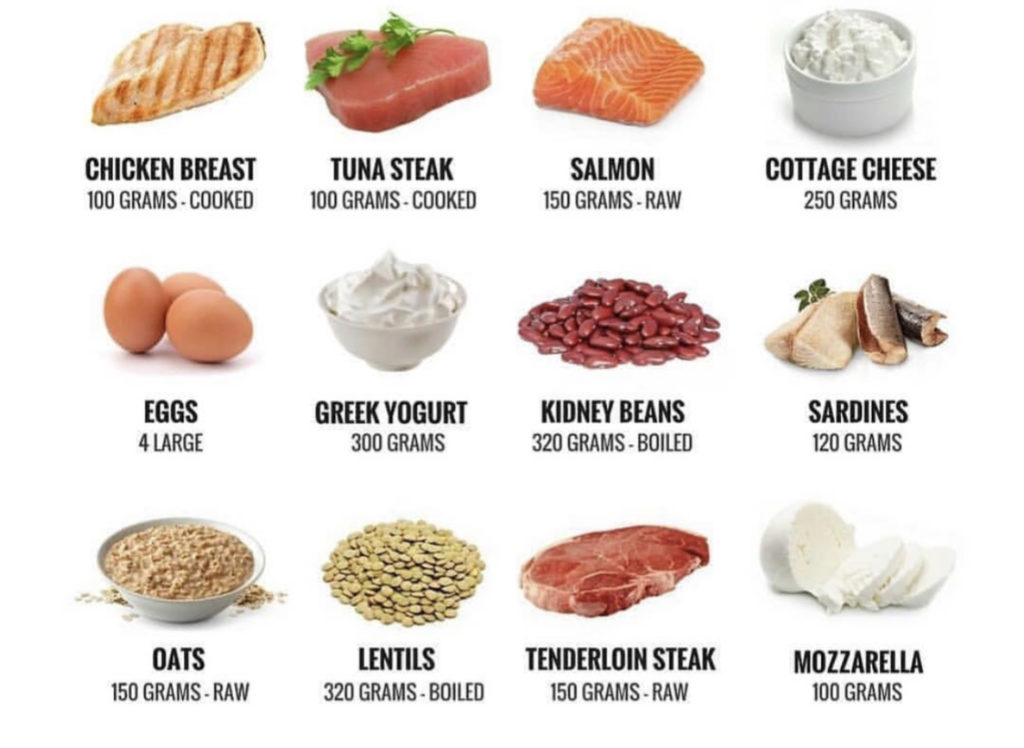One of the most popular supplements in the bodybuilding world is protein. Even if you don’t “fitness” much you’ve probably heard how important protein can be in order to build muscle.
Protein is made up of amino acids, which are the building blocks of muscle. It helps in the process of building, repairing and maintaining muscle. No matter what type of physical activity you do, it’s important to consume enough protein daily to help you repair and build your muscle tissue.
There is not a definitive answer to how much protein you should consume in a day. A simple gauge for you to use to make sure you’re getting a safe and beneficial amount is to take .8 grams of protein per pound of body weight. If you weigh 200 pounds, you should get 160 grams of protein daily (estimation).
A key thing to be aware of is that 1 gram of protein is equivalent to roughly 4 calories. If you eat 100 grams of protein in day that is 400 calories.
Here is a list of foods that contain Protein:

I find that the majority of my clients don’t eat enough protein. There are multiple reasons why this happens but a simple solution would be to add a scoop or two of protein powder daily. It’s quick, easy, and gets you closer to your macros (you should be counting macros)
Navigating the supplement world can be confusing and flat out difficult to make a decision on which protein to purchase. I’ll explain the types of proteins so that you can find one that suits your needs. You can also answer this quiz to select a protein powder that can help you unlock your full potential when working out an improve your workout results.
Types of Protein Powder
Whey Protein:
Whey is derived from milk and is probably the most popular protein purchased on the market. It tastes good, it’s high quality, it’s fairly cheap and it has the ability to enhance the immune system in a variety of ways. Whey protein is considered a complete protein and contains all 9 essential amino acids. It’s recommended to take immediately post workout as it’s quickly digested/absorbed into your body.
Whey is the liquid part of milk that separates during cheese production. If you’ve ever opened a yogurt contain to see liquid floating on top, this is whey. Once separated it goes through processing and turned into a powder for shakes, meal replacements and protein bars.
There are two types of whey protein that you need to be aware of.
Whey Concentrate – It’s a more economical per gram of protein (cheaper protein per gram). It has a low-lactose level and has very little carbs and fats. Lower end concentrates tend to have 30% protein and higher up to 80%.
Whey Isolate – Isolates remove all the fat and lactose making them Fat-free and lactose-free. However, it also removes some of the beneficial nutrients found in concentrates. It’s usually at least 90% protein or higher.
Recap: When purchasing whey protein, you’ll either be purchasing a whey concentrate, a whey isolate or a blend of both. If your goal is taste and nutrient density then go with a concentrate. If you trying to keep carbs and fat low then a whey isolate might be your best option.
Casein Protein (Milk Protein):
Like whey protein, casein is derived from milk. All forms of casein proteins contain a high-quality blend of essential, nonessential, and branch-chain amino acids (Whey contains way more BCAA’s). The major difference between casein and whey is the way they are absorbed in the digestive system. Casein protein tends to absorb at a much slower, steadier rate compared to whey. It’s usually known as “anti-catabolic” because of it’s slow acting nature and that is why it’s recommended to be consumed at night so it’s slowly released into your system while you sleep.
Recap: Casein is a slower absorbing protein and best if taken at night where you’ll have the greatest opportunity for muscle repair.
Egg White Protein:
Egg white protein is ideal for those who are allergic to dairy or milk proteins. This type or protein is pure egg whites and doesn’t contain yolks making them low in fat and cholesterol-free. FYI they are flavored so you’re not actually tasting straight egg whites.
Egg protein would be considered a medium digesting protein. It’s like a blend of both whey (fast digesting) and casein (slow digesting).
Recap: If you can’t/don’t want milk then this would be an ideal option as it’s one of the best sources of protein. Try a few different brands to find a taste that you like.
Plant Proteins:
These are alternatives to the traditional whey, casein and egg white proteins. They are derived from a variety of sources like soy, pea, hemp, rice and more. They are loaded with vitamins, minerals, antioxidants and fiber. These powders are suitable for people who are lactose sensitive or on vegetarian or vegan diets.
Most of these don’t taste very good due to the nature of what they are. So be sure to try a variety to find out which ones you like. Also, plant based DOES NOT mean healthier. Many people take plant proteins because of the perceived “health” benefit and thats simply not true. Take it because you like it or because you need it (lactose issues).
Recap: Great alternative to traditional milk based proteins. Perfect for lactose intolerant individuals and vegetarians/vegans. Buy a quality brand and find a flavor you like.
Beef Protein:
New to the party is Beef Protein. We’ve covered dairy, eggs, and plants so it’s not surprise beef is starting to gain popularity. Beef is one of the best sources of creatine and BCAA’s.
Here’s the low down on beef protein. It’s derived from gelatin which is essentially the left over parts of cows (joints, ligaments, hide, ears). It’s turned into a powdered form with added creatine and BCAA’s to make it seem like real beef. By no means am I saying this is unhealthy or it will cause harm, it’s just not on the same level as eating a filet mignon or ribeye.
The nice thing about these powders is they don’t taste like beef and come in a variety of flavors so it’s not difficult to swallow.
Recap: Not a bad option, but in my opinion there’s no reason to mess around with beef protein when there are better options on the market.
The Take Away
There are a lot of proteins on the market and it’s confusing when trying to find the right one. Not all of them are the same so it’s in your best interest to try a few and see how your body responds.
I also recommend that you track your macros in order to see how much protein you’re eating on a daily basis. This will dictate if you should supplement with a scoop or two daily. Happy Shopping and if you have questions don’t hesitate to ask!





















You must be logged in to post a comment Login